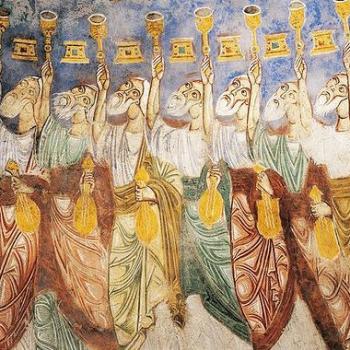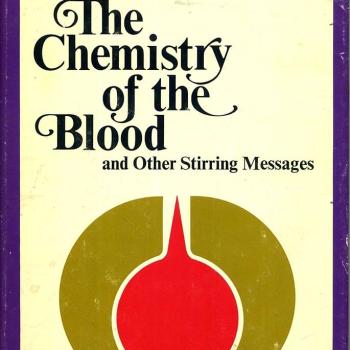How Important Is the Doctrine of the Trinity?
Here is a quote from Rowan Williams: “Trinitarian theology, in so far as it is concerned with what ‘kind’ of God Christians worship, is far from being a luxury indulged in solely by remote and ineffectual dons; it is of cardinal importance for spirituality and liturgy, for ethics, for the whole of Christian self-understanding.” (Wrestling with Angels: Conversations in Modern Theology, p. 142) This statement appears near the end of a magisterial discussion of Karl Barth’s doctrine of the Trinity that is equally complimentary and critical. But I lift it out here as a stand-alone statement, independent of the context, because it expresses a kind of over-arching evaluation of the doctrine of the Trinity or “trinitarian hermeneutics.” For Williams, as for Barth, as for numerous other Christian theologians past and present, the doctrine of the Trinity is crucial, essential, indispensable to a robust and healthy Christian view of God.
The problem is, of course, that many, perhaps most, Christians have little or no understanding of the doctrine of the Trinity. And they couldn’t care less. I once was a member of a church with the word “Trinity” in its name. During the eight years I attended there faithfully I don’t think I heard a single sermon on the Trinity. And I am almost sure that had I polled the congregation few would have been able to express, let alone explain, the doctrine of the Trinity.
But I don’t want to be too hard on the perplexed. The doctrine of the Trinity is perplexing. Augustine said that anyone who denies the Trinity loses his salvation but that anyone who tries to understand it loses his mind. And he said that he did not use the word “persons” (of the trinitarian three) because he wanted to but because there is no alternative.
I have known many devout Christian believers in and followers of Jesus Christ who struggled with the doctrine of the Trinity. I don’t fault them. At least they struggle with it.
Let me interrupt myself for a moment to say this: believing in the doctrine of the Trinity is not really the point; the point is to worship the triune God. However, the doctrine of the Trinity, while it cannot replace the triune God in our hearts, must have a place in our minds or else we end up in confusion about who God is.
Not all orthodox Christian theologians have agreed with Williams (and Barth) about the centrality of the doctrine of the Trinity for right understanding of God. Emil Brunner, Barth’s counterpart in Switzerland and the formation of “dialectical theology,” argued that the doctrine of the Trinity is not the gospel and is not something to preach. He rejected the idea that it is a revealed datum or the structure of revelation (a la Barth). For Brunner, the doctrine of the Trinity is a “defensive dogma”—a human creation intended to protect the deity of Jesus Christ and of the Holy Spirit while maintaining their distinctness from the Father. In other words, it’s a secondary language of faith, not primary.
John Wesley believed strongly in the doctrine of the Trinity, but he did not insist on belief in it for recognizing someone as a Christian. He knew it perplexed many sincere and devout Christians such as John Milton and many other nonconformists (e.g., Isaac Newton!).
I would not be as generous as Wesley perhaps was with regard to Arians, those who deny the deity of Jesus Christ. My struggle is with modalists (Sabellians) many of who seem genuinely confused about the doctrine of the Trinity. Some of them I know simply cannot seem to grasp how the doctrine of the Trinity is not belief in three gods. I do not have that problem. My problem is with understanding how a one-person God could be eternally love by nature and even how such a “monadic God” would not need a world for self-realization.
Back to the main point here. What exactly is the status of the doctrine of the Trinity? Is it an essential of Christian faith such that anyone who does not confess it is not a Christian?
I remember when I first started teaching theology, a student objected that I had not “explained the Trinity.” I tried to explain to him (and have ever since to numerous students) that one cannot “explain the Trinity.” But one can, and should try to understand and explain the doctrine of the Trinity. We must make a clear distinction between trinitarian dogma and the Trinity as Father, Son and Holy Spirit. Sure, there’s a connection, but it has to be a tenuous one or else we fall into confusing our ideas about God with God himself.
But how necessary is the doctrine of the Trinity?
First, what is the doctrine of the Trinity? Without getting into waters too deep, let’s define it ecumenically and very generally. It is that God is one God eternally existing inseparably and equally as three “persons” (hypostases). But we must immediately qualify that by saying that “person” here, in this doctrine, does not mean what “person” means in everyday American English. Our culture is so individualistic that to us “person” almost automatically connotes “separate self as individual center of consciousness and will.” With Dr. Seuss, we believe the job of a “person” is not to “fit in” but to “stand out.” That creates havoc with the doctrine of God! We must explain that when we say three “persons” we do not mean “person” in the common, American cultural, individualistic sense. What we do mean is not clear.
One way I express the doctrine of the Trinity to beginning theology students is that God is “one what and three whos.” Inadequate—yes. But a place to start. Actually, all expressions of the Trinity are inadequate. At their very best they differ only in degrees of technical precision. Technically, the classical doctrine of the Trinity is that God is “one ousia and three hypostases.” That’s usually translated “one substance and three subsistences” or “one substance and three persons.” (“Subsistence” is perhaps a better translation of “hypostasis” than “person” but the latter, if explained correctly, avoids the idea that the three are only relations or manifestations.”
Who can blame someone for struggling with this seemingly arid formula applied to God? And yet who can blame the early Christians for inventing it as a rule to rule out false doctrines of God (such as Arianism and modalism)?
Much to some perhaps more conservative folks’ chagrin, with Wesley I do not insist on affirmation of the doctrine of the Trinity for authentic Christianity. It is a clumsy doctrine, no matter how it’s expressed. So is the hypostatic union doctrine of the Person of Christ. I see both as necessary for a correct understanding of revelation and am convinced that most, if not all, God-fearing, Bible-believing, Jesus-loving Christians actually do believe something like them even if in very confused ways. To be very specific, while I consider modalism a heresy, I consider it a minor one and am convinced that the vast majority of Christians who seem to believe it do not really understand its implications or the orthodox doctrine of the Trinity. I have this sneaking suspicion that if I could sit down with them for an hour and talk it over I could dissuade them from their modalism and get them to affirm something like the doctrine of the Trinity even if not its formal language.
Here I’m agreeing with both Barth (and Williams’ quote above) and Brunner. With Brunner I affirm that the doctrine of the Trinity is not “gospel.” Nor is it part of the gospel we preach. It is a human construct and a defensive one. That God is triune, however, is necessarily implied by the gospel we preach. The biblical story necessarily includes the existence of Father, Son and Holy Spirit and the unity of God as one God. Anyone who denies the doctrine of the Trinity but affirms the gospel has some explaining to do. I personally don’t think they’ll succeed without affirming the doctrine of the Trinity. But not everyone has arrived there yet. If they are truly God-fearing, Bible-believing, Jesus-loving Christians (i.e., gospel people who view reality through the biblical story and message) and keep on thinking about it long and hard enough, they will.
Postscript:
Some years ago I spoke on this subject to a group of Christian college presidents. Afterwards, one of them (very well-known conservative evangelical) took my president aside and advised him to “investigate” me with a view to possibly firing me–not for denying the Trinity but for arguing that the DOCTRINE of the Trinity is less than essential for being a Christian. Now there’s a good example of what I consider fundamentalism–not only insisting that a person believe correct doctrine but that he exclude others who don’t believe correct doctrine in the same way. Fortunately my president did not agree.















